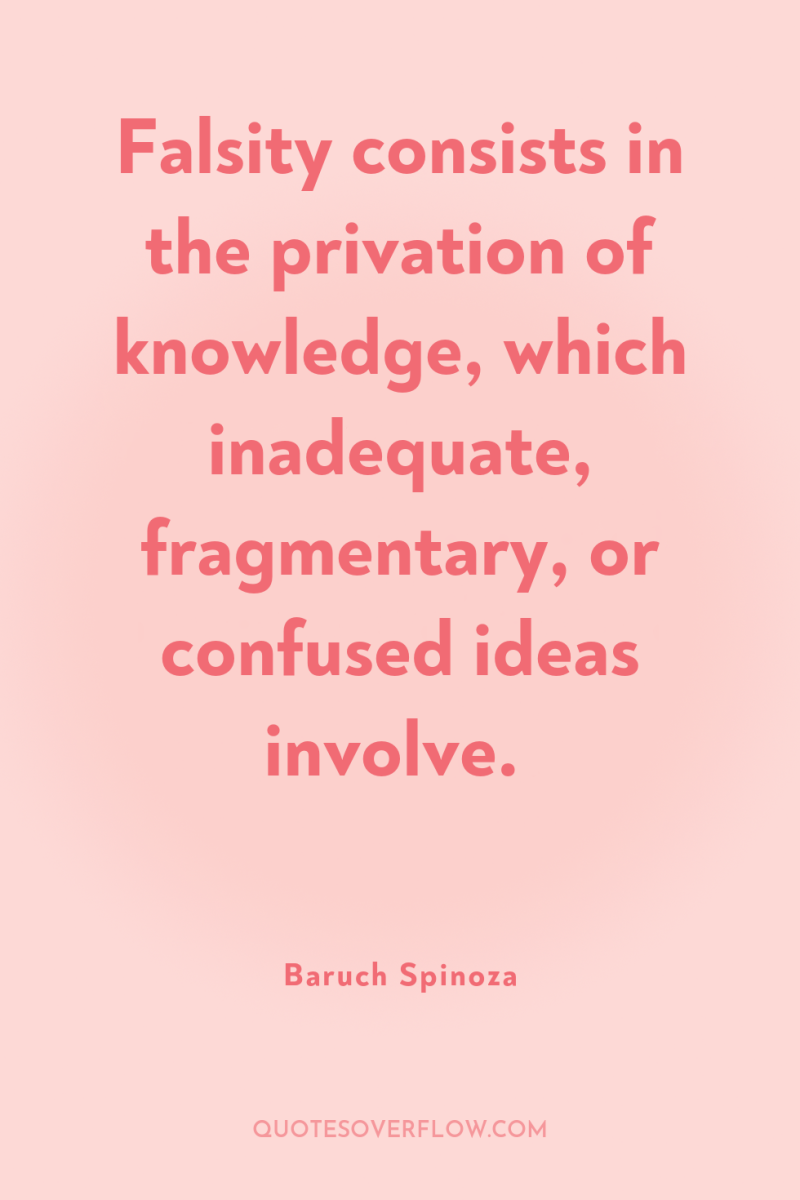
1
Whatsoever is, is in God, and without God nothing can be, or be conceivedBaruch Spinoza

2
The good which every man, who follows after virtue, desires for himself he will also desire for other men...Baruch Spinoza

3
Falsity consists in the privation of knowledge, which inadequate, fragmentary, or confused ideas involve.Baruch Spinoza

4
The purpose of the state is really freedom.Baruch Spinoza
5
Hence I think it is that democracies change into aristocracies, and these at length into monarchies, ' people at last prefer tyranny to chaos. Equality of power is an unstable condition; men are by nature unequal; and 'he who seeks equality between unequals seeks an absurdity.' Democracy has still to solve the problem of enlisting the best energies of men while giving to all alike the choice of those, among the trained and fit, by whom they wish to be ruled.Will Durant
6
He who has a true idea simultaneously knows that he has a true idea, and cannot doubt of the truth of the thing perceived.Baruch Spinoza
7
The order and connection of ideas in the same as the order and connection of thingsBaruch Spinoza
8
The object of the idea constituting the human mind is the bodyBaruch Spinoza
9
We are tossed about by external causes in many ways, and like waves driven by contrary winds, we waver and are unconscious of the issue and our fate.' We think we are most ourselves when we are most passionate, whereas it is then we are most passive, caught in some ancestral torrent of impulse or feeling, and swept on to a precipitate reaction which meets only part of the situation because without thought only part of a situation can be perceived.Will Durant
10
For though men be ignorant, yet they are menBaruch Spinoza
11
Hatred is increased by being reciprocated, and can on the other hand be destroyed by love.Baruch Spinoza
12
Israel's monomaniacal Spinoza worship is amusing and exasperating by turns. For a start, his insistence that Spinoza was the singular font of the Enlightenment leaves him without a story of the Enlightenment's intellectual or cultural origins. Every historian has to begin somewhere, but the fact that Israel begins with Spinoza, and then reduces most of what follows the philosopher to a footnote, leaves his account of the Enlightenment founded on something like immaculate conception.Samuel Moyn
13
Consistent with the liberal views of the Enlightenment, Leibniz was an optimist with respect to human reasoning and scientific progress. Although he was a great reader and admirer of Spinoza, Leibniz, being a confirmed deist, rejected emphatically Spinoza's pantheism.Shelby D. Hunt
14
Nothing forbids man to enjoy himself, save grim and gloomy superstitionBaruch Spinoza
15
Men, in so far as they live in obedience to reason necessarily do only such things as are necessarily good for human nature, and consequently for each individual man.Baruch Spinoza
16
Spinoza says that if a stone which has been projected through the air, had consciousness, it would believe that it was moving of its own free will. I add this only, that the stone would be right. The impulse given it is for the stone what the motive is for me, and what in the case of the stone appears as cohesion, gravitation, rigidity, is in its inner nature the same as that which I recognise in myself as will, and what the stone also, if knowledge were given to it, would recognise as will.Arthur Schopenhauer